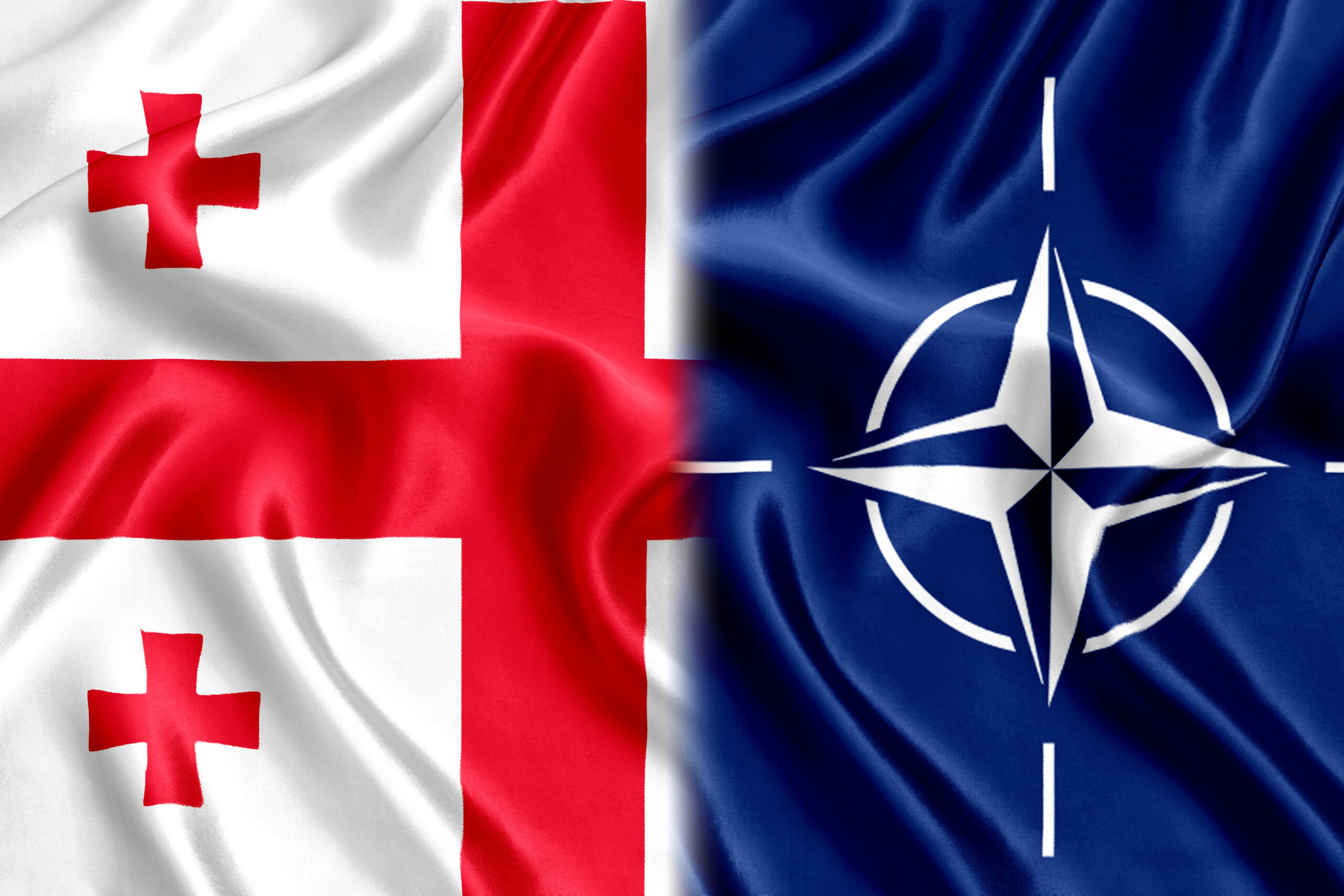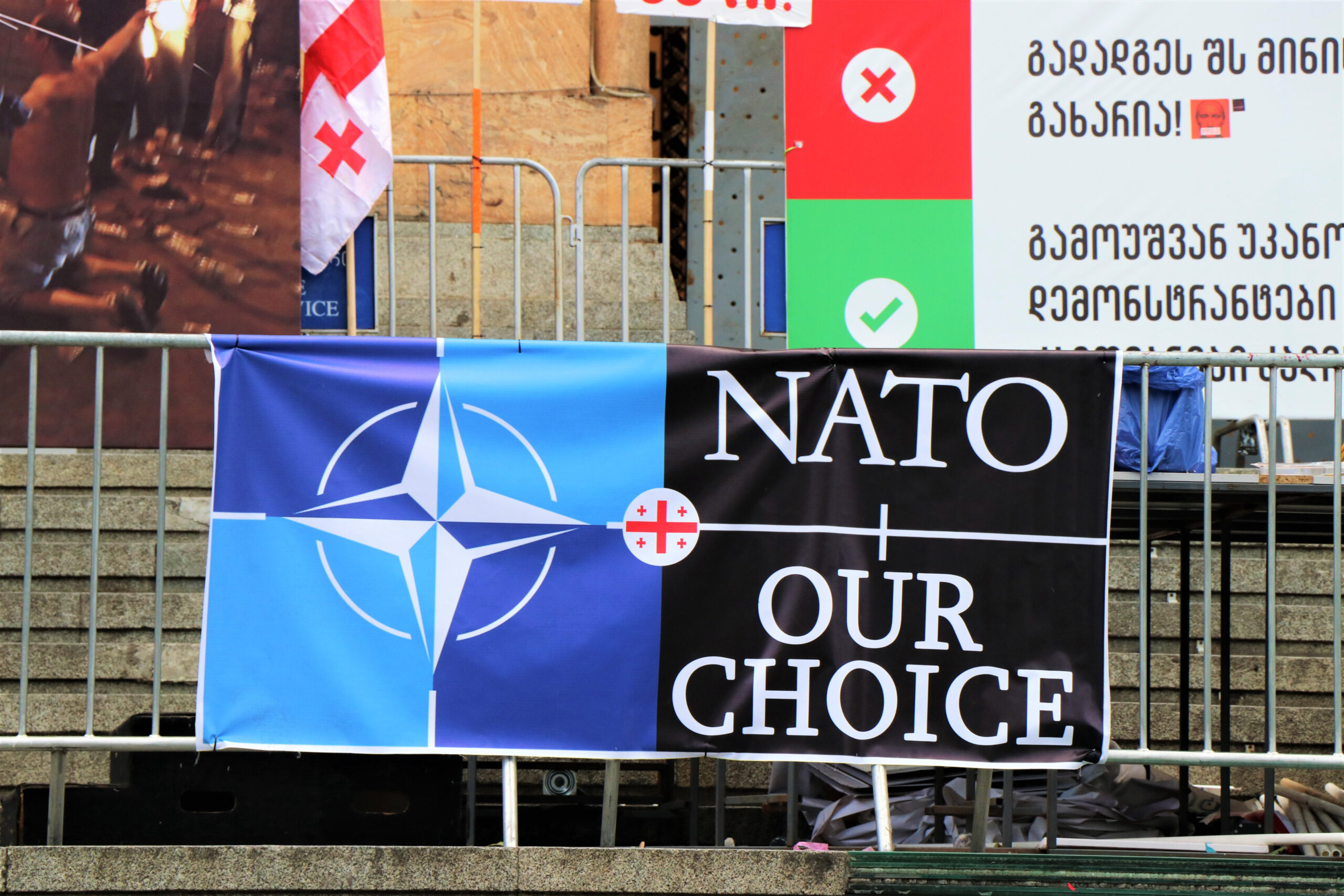Georgia and its potential NATO membership in 2023
Alexandra Tóthová
Since regaining its independence from the Soviet Union in 1991, Georgia has long been making statements regarding its leaning toward full integration into Western Structures. This year, however, the video footage of Nana Malashkhia holding the flag of the European Union while being targeted by the water cannon (1) during a demonstration against the “foreign agents” law proposal flew over the globe, becoming an iconic moment for illustration of the deep polarization that is present in society. The society of Georgia overwhelmingly wanted to join the European Union, many were rightly afraid that this law would get them even further from the membership.
Article 78 of the Georgian Constitution claims the following: “The constitutional bodies shall take all measures within the scope of their competencies to ensure the full integration of Georgia into the European Union and the North Atlantic Treaty Organization” (2). With the Association Agreement and the Deep and Comprehensive Free Trade Area Agreement (AA/DCFTA) being in force since 2016, there is already a strong link with the EU. Not granting the candidate status for Georgia in June 2022 was due to political reasons– once the political criteria are fulfilled, the EU is ready to reevaluate. The intentions of the government are somewhat unclear. It is possible that Georgia will gain the EU candidate status, nevertheless not because the political leadership is steering the nation towards it but despite the course towards “strategic autonomy” because the citizens deserve it.
Membership in the NATO is more questionable. At the moment, in short, it does not look like Georgia will be acting on its membership aspiration if still being in place at all, but the cooperation is deepening.
Cooperation with NATO
Membership in the European Union is more popular among its citizens because of its promising economic prosperity, with around 85% of Georgians supporting the idea of joining. NATO is popular as well, with around 74% of the population favoring the membership (3). This support reflects an ongoing process that started in the 2000s when Georgia built many ties with both organizations.
In 1992, Georgia became a member of the North Atlantic Cooperation Council, a forum to exchange views and for joint military exercises between NATO and non-NATO states. The bilateral cooperation under the Partnership for Peace started in 1994. Following the so-called Rose Revolution in 2003, when today’s controversial Mikheil Saakashvili took power, the relations deepened further. In 2008, during the NATO summit in Bucharest, the Allies agreed that Georgia would become a member, confirmed by following summits. Diplomatic ties are strong. Georgia hosted the North Atlantic Council, the highest political body, numerous times. Georgia also receives a substantial military aid package to keep their forces strong and operable.
Georgian soldiers are training under NATO instructors, and there have been numerous joint missions conducted, such as contribution to counter-terrorist maritime surveillance in the Mediterranean Sea, Georgia contributed to the Kosovo Force (KFOR) and was also the top contributor in Afghanistan.
„After the war, NATO was believed to become the only security guarantee for Georgia, or at least, that has been the narrative in place in Georgian public life. In the last year and a half, there has been a shift, which also contributed to not granting the EU candidate status. Georgian Dream, the ruling political party, on the surface is presenting commitment towards Euro-Atlantic integration but feeds the polarisation in the society with counterintuitive actions. „
Will the NATO gain one more member on the shores of the Black Sea? Not while Russia watches
While on paper, the relations are converging, it is unsure whether Georgia is actively seeking shelter under the Allience`s nuclear umbrella in the midst of the War in Ukraine. Russian Foreign Minister Sergei Lavrov, during his visit to Georgia in 2019, said on Georgia`s potential membership in NATO that Russia “will not start a war, but such conduct will undermine our relations with NATO and with countries who are eager to enter the alliance” (4).
During GLOBSEC 2023, Prime Minister Irakli Garibashvili claimed that the war in Ukraine was caused by NATO`s enlargement (5), repeating the Kremlin`s narrative. The Amendment of Article 78 of the Constitution in 2018 insists on taking all measures to ensure the full integration of Georgia into the European Union and the North Atlantic Treaty Organisation. However, this government is very cautious with the timing.
The two self-declared autonomous republics occupying around 20% of Georgia`s territory, Abkhazia and South Ossetia are complicating the NATO-Georgian-Russian relationship nexus. Abchadzia is controlling around half of the shoreline to the Black Sea, while South Ossetia is clunking to the mountains separating Georgia from Russia. While Kyiv had days to prepare until Russian forces arrived at the gates of the capital city, active Russian soldiers are constantly stationed in South Ossetia and could reach Tbilisi in just a matter of 2-3 hours. Georgia´s main East-West highway near Didi Khurvaleti could be cut in a matter of minutes. Borderisation is an ongoing threat.
These frozen conflicts are the results of the war in 2008 after former President Saakashvili knocked on NATO`s door: in 2008, Saakashvili announced a referendum for joining the Alliance prior to the Bucharest Summit, hoping to gain the Membership Action Plan, but in 2008 Germany and France were not favouring the membership of Georgia. After the Summit, NATO released an infamous declaration that Georgia could join in the future, leaving Georgia in a so-called permanent waiting room. This did not boost the security guarantees for Georgia but infuriated Putin. A few months after the Bucharest summit, the so-called five-day war broke out with Russia, during which Georgia lost its territories, its navy and air force.
After the war, NATO was believed to become the only security guarantee for Georgia, or at least, that has been the narrative in place in Georgian public life. In the last year and a half, there has been a shift, which also contributed to not granting the EU candidate status. Georgian Dream, the ruling political party, on the surface is presenting commitment towards Euro-Atlantic integration but feeds the polarisation in the society with counterintuitive actions.
Based on data from the Ministry of Finance, imports into Georgia from the Russian Federation surged by 82%, or $1,035 million, between March 2022 and February 2023 when compared to the previous equivalent period (6). Based on the analysis of the Open Caucasus, Party Chairman Irakli Kobakhidze made 9 critical comments on Russia, 26 on Ukraine and nearly 60 on the West (7). Georgian Dream leadership often claims that the EU is trying to drag Georgia into the war against Russia. The ruling party is borrowing many controversial statements from Hungary`s Viktor Orban.
It is important to mention that the Georgian Dream is the project of Bidzina Ivanishvili, an infamous oligarch whose name was figured in both the Panama Papers and the Pandora Papers. Ivanishvili gained his wealth in Russia in the 1990s. In 2022, the European Parlament called for a resolution of sanctioning Ivanishvii. Although not a political figure per se, he is active behind the scenes.
Conclusion
Before the war in Ukraine, NATO was believed to be the beacon of security guarantee, and in many senses, it is. Thus, Finland and Sweden came to the conclusion of joining the Alliance. On the other hand, the narrative that it could trigger Russia into attack is more prevalent among the political elites of Georgia. Narratives that NATO is not doing enough in terms of support for Ukraine to defend itself also prevail. After receiving the Action plan for membership and before actually joining the alliance, Georgia would become vulnerable. They do not want to wake up the giant at their doorstep. In addition, the economic benefits of working with Russia while sanctions are imposed worldwide allow the Georgian economy to boost itself, which is definitely perceived as a plus.
The two Russian-backed separatist regions compromising the territorial integrity, Abkhazia and South Ossetia, might be too high of a risk of confrontation with Russia, as well. Moreover, Georgia would be hard to defend since there is only one single Alliance member state bordering Georgia, Turkiye, sharing less than 300km of mountainous border, making the transportation of technical equipment challenging and bearing the potential of chokepoints. Under current circumstances, NATO should wait to open the door for Georgia, but neither should close it.
Sources:
- The Georgian Woman With The EU Flag (rferl.org)
- CONSTITUTION OF GEORGIA | სსიპ ”საქართველოს საკანონმდებლო მაცნე” (matsne.gov.ge)
- Public Opinion Survey Residents of Georgia | September 2022 | International Republican Institute (iri.org)
- Russian FM Lavrov supports resumption of flights to Georgia as Georgians ‘realised consequences’ of June 20 (agenda.ge)
- CHAT: The Tbilisi Two Step: Resisting Moscow, Reclaiming Brussels? – YouTube
- 20308.pdf (fes.de)
- Irakli Kobakhidze: The face of Georgia’s turn from the West (oc-media.org)
- 2022-06-2324-euco-conclusions-en.pdf (europa.eu)
- Georgia opinion and Annex.pdf (europa.eu)
- NATO – Topic: Relations with Georgia
- Meeting of the North Atlantic Council in Georgia – Poland in NATO – Gov.pl website (www.gov.pl)
- Georgian Prime Minister Garibashvili at GLOBSEC 2023 – “NATO expansion caused the war in Ukraine, but the United States is our number one strategic partner.” – Strategic analysis
- Georgians dream of EU membership as their leaders move closer to Putin | Georgia | The Guardian
- Saakashvili: NATO Was Ready To Offer Us MAP, Until… | Eurasianet
- Saakashvili: Georgia Was Ready To Trade NATO For Breakaway Regions (rferl.org)
- Why NATO Should Not Offer Ukraine and Georgia Membership Action Plans – War on the Rocks
Alexandra Tóthová is an Executive Director at the Strategic Analysis Think Tank.



Contact us